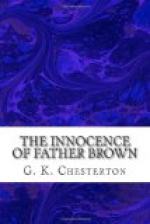Leonard Quinton, the poet, had himself most carefully arranged this effect; and it is doubtful whether he so perfectly expressed his personality in any of his poems. For he was a man who drank and bathed in colours, who indulged his lust for colour somewhat to the neglect of form—even of good form. This it was that had turned his genius so wholly to eastern art and imagery; to those bewildering carpets or blinding embroideries in which all the colours seem fallen into a fortunate chaos, having nothing to typify or to teach. He had attempted, not perhaps with complete artistic success, but with acknowledged imagination and invention, to compose epics and love stories reflecting the riot of violent and even cruel colour; tales of tropical heavens of burning gold or blood-red copper; of eastern heroes who rode with twelve-turbaned mitres upon elephants painted purple or peacock green; of gigantic jewels that a hundred negroes could not carry, but which burned with ancient and strange-hued fires.
In short (to put the matter from the more common point of view), he dealt much in eastern heavens, rather worse than most western hells; in eastern monarchs, whom we might possibly call maniacs; and in eastern jewels which a Bond Street jeweller (if the hundred staggering negroes brought them into his shop) might possibly not regard as genuine. Quinton was a genius, if a morbid one; and even his morbidity appeared more in his life than in his work. In temperament he was weak and waspish, and his health had suffered heavily from oriental experiments with opium. His wife —a handsome, hard-working, and, indeed, over-worked woman objected to the opium, but objected much more to a live Indian hermit in white and yellow robes, whom her husband insisted on entertaining for months together, a Virgil to guide his spirit through the heavens and the hells of the east.
It was out of this artistic household that Father Brown and his friend stepped on to the door-step; and to judge from their faces, they stepped out of it with much relief. Flambeau had known Quinton in wild student days in Paris, and they had renewed the acquaintance for a week-end; but apart from Flambeau’s more responsible developments of late, he did not get on well with the poet now. Choking oneself with opium and writing little erotic verses on vellum was not his notion of how a gentleman should go to the devil. As the two paused on the door-step, before taking a turn in the garden, the front garden gate was thrown open with violence, and a young man with a billycock hat on the back of his head tumbled up the steps in his eagerness. He was a dissipated-looking youth with a gorgeous red necktie all awry, as if he had slept in it, and he kept fidgeting and lashing about with one of those little jointed canes.
“I say,” he said breathlessly, “I want to see old Quinton. I must see him. Has he gone?”
“Mr. Quinton is in, I believe,” said Father Brown, cleaning his pipe, “but I do not know if you can see him. The doctor is with him at present.”




